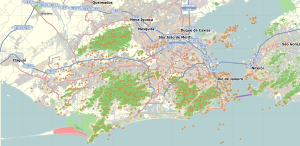This article needs additional citations for verification. (July 2016) |
Grumari is a neighborhood in the West Zone of Rio de Janeiro, Brazil. Grumari is a municipal park and is the city's only neighborhood with no residents. Grumari has beaches that have not changed in hundreds of years. Salt marsh vegetation grows next to the beach and a rain forest surrounds its hills.
Grumari | |
|---|---|
Neighborhood | |
 | |
| Coordinates: 23°03′12″S 43°32′06″W / 23.05333°S 43.53500°W | |
| Country | |
| State | Rio de Janeiro (RJ) |
| Municipality/City | Rio de Janeiro |
| Zone | West Zone |
A nude beach is next to Grumari beach called Abricó beach (Portuguese for Apricot beach). It is the only nude beach around the city. Five virgin beaches with pristine vegetation are in this neighborhood: Inferno Beach (Hell's beach), Funda beach (Deep Beach), Búzios beach (Whelks beach), Meio's beach (middle's beach) and Perigoso beach (dangerous beach).
The word Grumari comes from ancient South American dialects.[clarification needed] the word refers to the tip of a mammal's nipples. In the same way, the beach sticks out onto the ocean, "feeding" the fish.[1]
Gallery
edit-
Prainha, called "little beach" in English
-
Grumari Beach Parking
-
Kiosk on the beach
-
Grumari Panorama
-
Road to Grumari Beach
-
Grumari Beach, West Zone of Rio de Janeiro City, Left corner of the beach
-
A Nude Beach at Grumari
-
Grumari Swamps
-
Wild Virgin Beach at Grumari Neighborhood. Hell´s Beach or Praia do Inferno, in Portuguese
-
Night view Of Grumari
References
edit- ^ "Grumari Beach - photos & how to get there from Rio de Janeiro". www.rio-de-janeiro-travel-information.com. Retrieved 2015-11-18.
External links
edit- "Grumari Beach". usnews.com.
- "Grumari Beach". tripadvisor.com.
- "Grumari Beach - photos & how to get there from Rio de Janeiro". rio-de-janeiro-travel-information.com.

